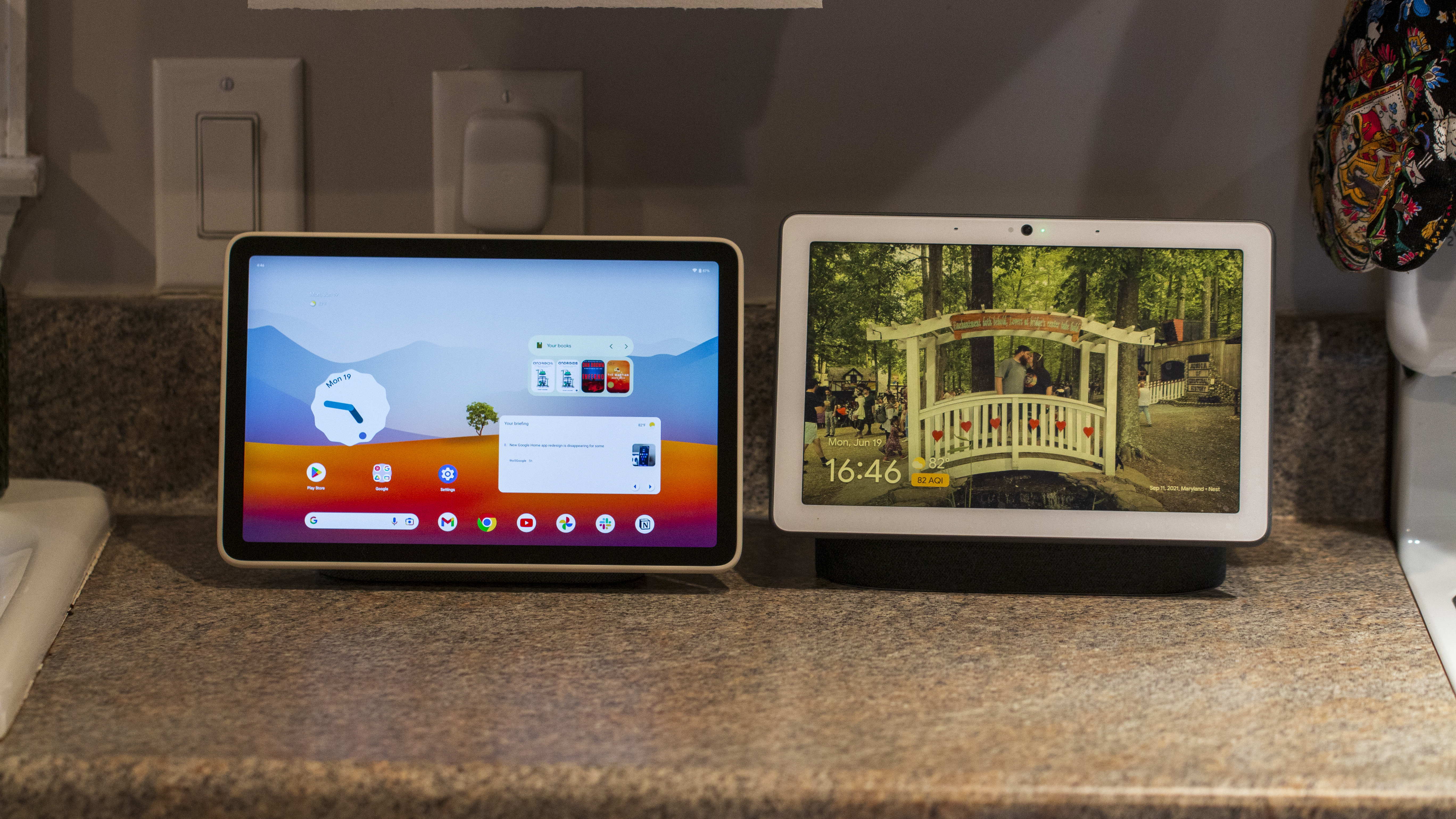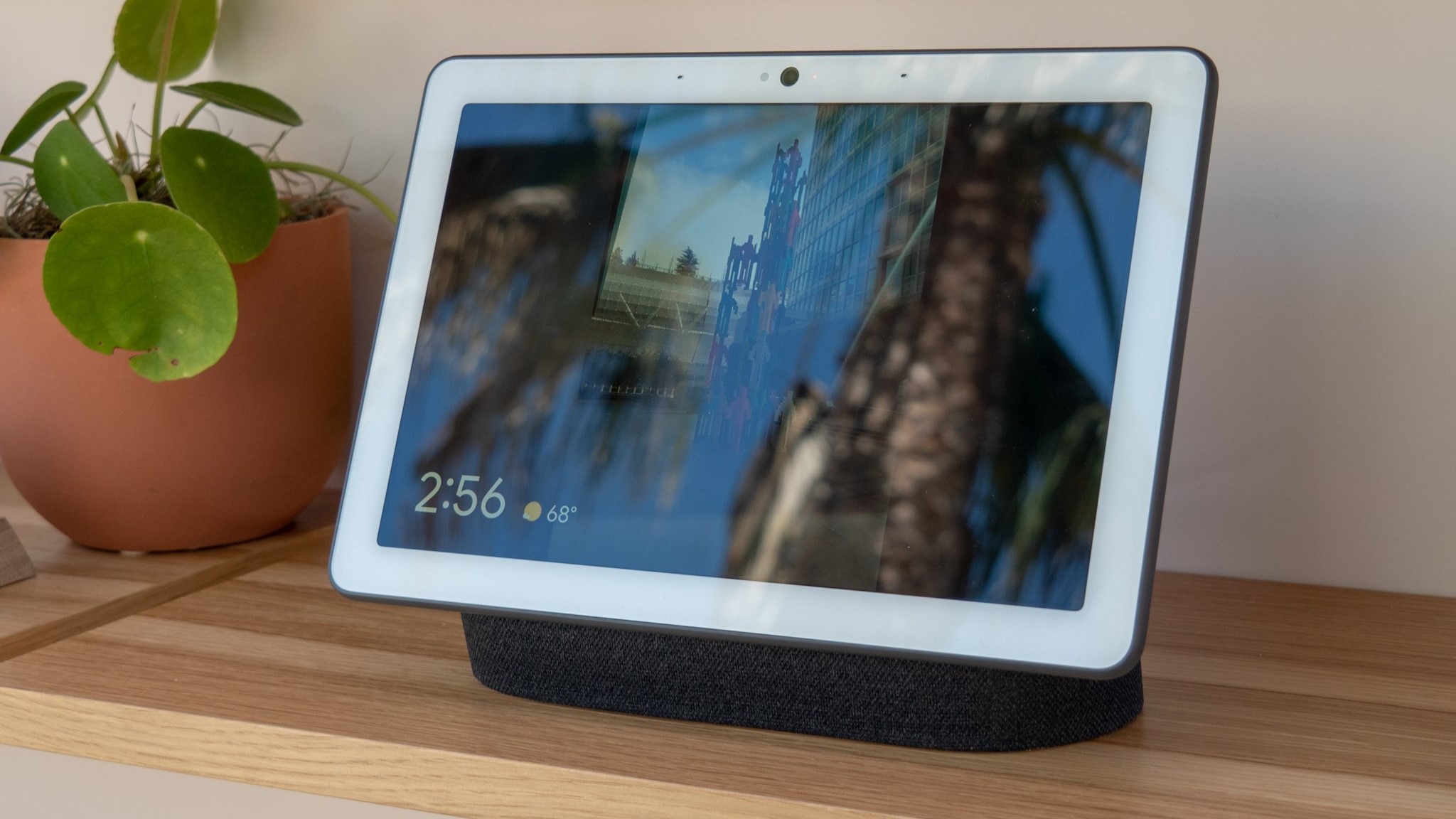What you need to know
- A new report uncovered references to a new Nest Hub Max smart display in an update to the Google Home app.
- The release of the Pixel Tablet, which includes a speaker dock and has smart display functionality, was expected to doom the Nest Hub lineup’s future.
- However, the surprising indication that Google may refresh the Nest Hub Max is a good thing because the Pixel Tablet and Nest Hub Max are products for different use cases.
There was a bittersweet feeling for fans of Google’s Nest Hub lineup when it unveiled the Google Pixel Tablet because it seemed to doom the future of the company’s dedicated smart displays. However, there are now indications that the five-year-old Nest Hub Max might finally receive a much-needed refresh. While the current Nest Hub Max is still a solid smart home controller despite being released first in 2019, there are a few things about the display that make it feel ancient.
In version 3.16 of the Google Home app, references to a new and unreleased Nest Hub Max model were uncovered in an APK teardown by the team at 9to5Google. The report says that the unknown device is clearly listed as a Nest Hub Max in code for the Google Home app, leaving little room for different interpretations. It also notes that this new device won’t be powered by Android, and will instead use the same Fuchsia OS that powers current Nest Hub displays.
This all but confirms that a potential next-generation Nest Hub Max will still keep its smart display identity and not follow in the Pixel Tablet‘s footsteps. That device runs Android but also features a smart display mode that makes it comparable in functionality to Nest Hub devices. Google could have easily pivoted its strategy with a subsequent Nest Hub Max, ditching Fuchsia for its new Android smart display mode.
That said, it certainly looks like Google is planning to freshen up its smart home offerings this year. The same report reveals that a new Nest Audio product might be on the way, while a prior report shared that Google is likely planning to launch a new Chromecast with Google TV 4K.
We don’t know when (or if) this upgraded Nest Hub Max might launch. Still, let’s take a look at why the smart display still has a place in Google’s 2024 product lineup and what we want to see.
Why the Pixel Tablet and Nest Hub Max need to coexist

If you compare the Pixel Tablet and the Nest Hub Max, it might be easy to declare the Pixel Tablet as the clear winner at first glance. However, in reality, it’s much more complicated than that. The obvious difference between these two devices is the price: the Pixel Tablet starts at $500, while the Nest Hub Max costs $230. Both devices are frequently available at a discount, but the Nest Hub Max can be bought for under $200 easily during deals holidays like Black Friday.
So, the Pixel Tablet is not a one-size-fits-all solution for your smart home needs simply because it costs double the price of the Nest Hub Max. It’s true that the Pixel Tablet is, well, a tablet — and that makes it a great value for people who are in the market for both an Android tablet and a smart display. I was in the market for something like a Pixel Tablet or a Nest Hub Max late last year, but when it came down to it, I ended up buying the latter because I simply didn’t need a tablet.
The Pixel Tablet has clear versatility benefits, but it isn’t the best for every situation. For starters, the included speaker docking station generally doesn’t sound as good or as loud as the Nest Hub Max. Additionally, the Pixel Tablet doesn’t include a Thread radio, so you can forget setting up your Nest Audio hardware as the device’s default speaker outputs. If you need a smart home controller first and foremost, the five-year-old Nest Hub Max is still the cream of the crop.
What I want to see in a Nest Hub Max refresh

That’s not to say that the current Nest Hub Max isn’t desperately in need of a refresh. The display is perhaps the biggest thing in need of an upgrade, especially when compared to the Pixel Tablet. The white bezels of the Nest Hub Max display are massive and look incredibly outdated compared to the slimmer bezels on the Pixel Tablet.
The Nest Hub Max can also feel slow at times and doesn’t respond to requests perfectly in others. A hardware upgrade and software improvements would be greatly appreciated by Nest Hub Max owners, and these might prepare the Nest Hub Max to move away from Google Assistant. Google appears to be shifting away from Assistant and moving to Gemini, and new internal components might help Gemini power a new smart display.
Google will likely take notes from the second-generation Nest Hub, which added a new sensor for tracking sleep quality. This probably doesn’t matter as much on the Max because it is better suited for countertop use, but it seems like an easy inclusion.
We hope that pricing for a second-gen Nest Hub Max will remain competitive and ideally stay at $230. If there’s a true and meaningful overhaul, a price of around $250 is still justifiable, but a price bump that nears $300 would overlap with the Pixel Tablet.
With rumors swirling about various unreleased Google hardware products, all eyes are on Google I/O, as we expect to see at least one of them at the developer-focused event. The budget Pixel 8a smartphone looks to be the most likely product to launch at I/O, but it’s also possible Google surprises us with something like a Chromecast or Nest device. Even if no smart home hardware products debut, Google might discuss its software strategy at I/O instead. Either way, if you’re interested in Google’s smart home efforts, it’s worth keeping tabs on I/O and our coverage of the mid-May event.